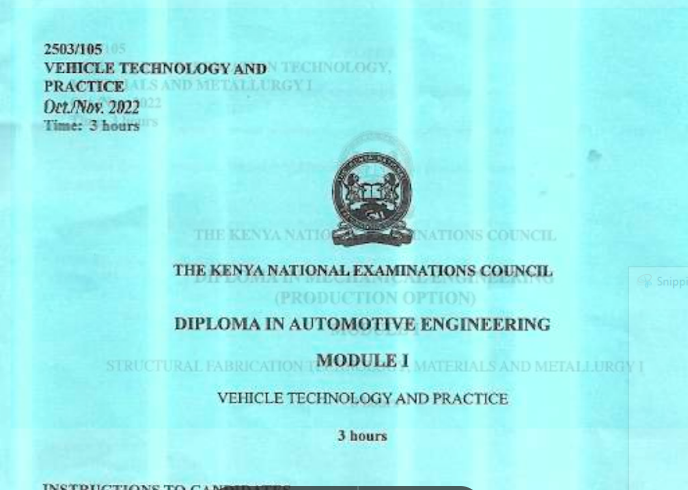Certificate in automotive engineering module 1 KNEC past papers
- Workshop technology KNEC past papers
- Vehicle technology KNEC past papers
- Vehicle body works KNEC past papers
- Technical drawing KNEC past papers
- Motor vehicle trade practice KNEC past papers
- mathematics 1 KNEC past papers
- ICT KNEC past papers
- Entrepreneurship education KNEC past papers
- Electrical principles KNEC past papers
- Applied science KNEC past papers
Automotive engineering is a branch of vehicle engineering that focuses on the application, design and manufacturing of various types of automobiles. This field of engineering involves the direct application of mathematics in the design and production of vehicles.
certificate in automotive engineering module 1 units
- Entrepreneurship
- Life Skills
- Communication Skills
- Mathematics
- Vehicle Body Work
- Electrical Principles
- Workshop Technology
- Applied Science
- Vehicle Technology
- Occupational Safety & Precautions
certificate in automotive engineering module 2 units
- Technical Drawing
- Mathematics II
- Vehicle Electrical and Electronic Systems
- Vehicle Engine Technology
- Driving Skills
- Workshop Organization and Management
- Business Plan
- Trade Project
Benefits of KNEC past papers
- It improves learners knowledge
- Helps you understand the units taught
- Gives the learners insight on what kind of questions to expect
- Prepares learners for their main end of course exam.
- Helps trainers in creating assessment tools
- Supplements learner’s education.
- Helps in group discussion
MORE KNEC PAST PAPERS:
- Diploma in ICT module 2 KNEC past papers Free download
- Diploma in ICT module 3 KNEC past papers Free download
- Certificate in ICT module 1 KNEC past papers Free download
- Certificate in ICT module 2 KNEC past papers Free download
- Diploma in Electrical and electronic engineering module 1 KNEC past papers Free download
- Diploma in electrical and electronic engineering module 2 KNEC past papers Free download
- Diploma in Human resource management module 1 KNEC past papers Free download
- Diploma in human resource management module 2 KNEC past papers Free download
- Craft in supply chain management module 1 KNEC past papers Free download
- Certificate in electrical and electronic engineering module 1 KNEC PAST PAPERS
- Certificate in electrical and electronic engineering module 2 KNEC PAST PAPERS
- Craft in supply chain management module 1 KNEC PAST PAPERS
- Diploma in building technology module 1 KNEC PAST papers
- Diploma in building and technology module 2 KNEC past papers
- Diploma in building and technology module 3 KNEC past papers
- Diploma in civil engineering module 1 KNEC PAST PAPERS
- Diploma in civil engineering module 2 KNEC PAST PAPERS
- Diploma in civil engineering module 3 KNEC PAST PAPERS
- Craft in supply chain management module 2 KNEC PAST PAPERS
- Diploma in Quantity survey KNEC past papers
- Certificate in plumbing module 1 KNEC past papers
- Certificate in building and technology module 1 KNEC past papers
- Certificate in building and technology module 2 KNEC past papers
- Diploma in social work and community development module 1 KNEC past papers
- Diploma in social work and community development module 2 KNEC past papers
- Diploma in social work and community development module 3 KNEC past papers
- Diploma in electrical and electronic engineering module 3 KNEC past papers
- Diploma in Human resource management module 3 KNEC past papers
- Diploma in supply chain management module 3 KNEC past papers
- Diploma in supply chain management module 1 KNEC past papers
- Certificate in human resource management module 2 KNEC past papers
- Diploma in supply chain management module 2 KNEC past papers
- Certificate in human resource management module 1 KNEC past papers
- Certificate in food and beverage module 1 KNEC past papers
- Certificate in food and beverage module 2 KNEC past papers
- Diploma in catering and accommodation module 1 KNEC past papers
- Diploma in catering and accommodation module 2 KNEC past papers
- Diploma in catering and accommodation module 3 KNEC past papers
- Diploma in food and beverage module 1 KNEC past papers
- Diploma in food and beverage module 2 KNEC past papers
- Diploma in food and beverage module 3 KNEC past papers
- Diploma in tourism management module 1 KNEC past papers
- Diploma in tourism management module 2 KNEC past papers
- Diploma in tourism management module 3 KNEC past papers
- Certificate in tour guiding and travel operations module 1 KNEC past papers
- Certificate in tour guiding and travel operations module 2 KNEC past papers
- Diploma in business management module 1 KNEC past papers
- Diploma in business management module 2 KNEC past papers
- Diploma in business management module 3 KNEC past papers
- Diploma in sales and marketing module 1 KNEC past papers
- Diploma in sales and marketing module 2 KNEC past papers
- Diploma in sales and marketing module 3 KNEC past papers
- Certificate in business management module 1 KNEC past papers
- Certificate in business management module 2 KNEC past papers
- Certificate in project management module 1 KNEC past papers
- Certificate in project management module 2 KNEC past papers
- Certificate in sales and marketing module 1 KNEC past papers
- Diploma in agriculture module 1 KNEC past papers
- Diploma in agriculture module 2 KNEC past papers
- Diploma in agriculture module 3 KNEC past papers
- Diploma in early childhood development KNEC past papers
- Certificate in early childhood development and education KNEC past papers
- Artisan certificate in welding and fabrication KNEC past papers
- Artisan certificate in plumbing KNEC past papers
- Artisan certificate in painting and decorating KNEC past papers
- Artisan in leatherwork technology KNEC past papers
- Artisan certificate in motor vehicle mechanics KNEC past papers
- Artisan certificate in masonry KNEC past papers
- Artisan certificate in General agriculture KNEC past papers
- Artisan certificate in general fitter KNEC past papers
- Artisan certificate in garment making KNEC past papers
- Artisan certificate in electrical installation KNEC past papers
- Artisan certificate in Carpentry and joinery KNEC past papers
- Artisan certificate in agricultural mechanics KNEC past papers

